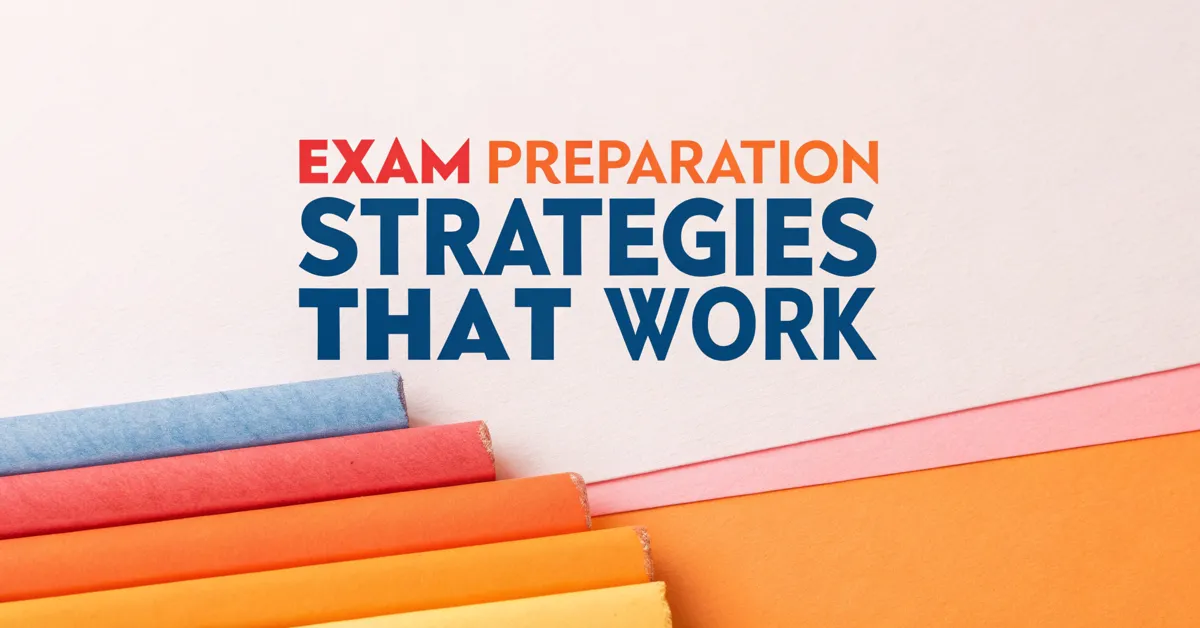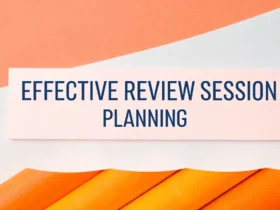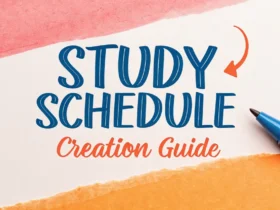Is exam prep stressing you out? Are you looking for study methods that truly work? You’re not alone. Many students struggle with how to prepare effectively. They face the pressure of tests and search for systems that help them succeed. Did you know that studies show students who use proven exam prep strategies perform better than those who just cram?
This article will give you tested exam prep strategies. It will go over approaches that will help you study smarter, not harder. You will discover how to build a schedule, use active recall, and handle test anxiety. These skills will make exam time less of a burden and more of a chance to show what you’ve learned.
Exam Prep Strategies That Work
Understand Your Exam
Before you start any exam prep, know what you’re up against. This means more than just knowing the topic. You must grasp the exam style, what it will cover, and how it’s graded.
- Identify the exam type: Is it multiple choice, essay-based, or a mix? Some tests call for fact recall, and others might call for problem-solving or deep analysis. Knowing this helps you change your study plan.
- Outline topics and weight: What subjects will the exam cover? Are some worth more points than others? Aim your efforts where it counts most. Check the course outline or ask your teacher for details.
- Collect past papers: Old exams are gold. They show you the kinds of questions asked and how the test is set up. Do these papers to get used to the test’s rhythm and find where you need more prep.
Craft a Study Schedule
A solid study schedule is key to exam prep. It keeps you on track, stops last-minute cramming, and helps you get through all the material.
- Set aside specific times: Set study blocks in your week, like you would for any class or event. Be steady. Set alarms and see these times as things you can’t miss.
- Divide up the material: Break your topic into smaller parts. Sort these out over your study times. That way, you deal with the load in bits, not all at once.
- Set clear, reachable goals: For each study time, decide what you want to get done. Don’t just say “study math.” Rather, say “finish math chapter 3” or “do 20 math problems.”
- Mix up subjects: Don’t spend too long on one thing. Mix things up. Change between topics to keep fresh and stop burnout.
- Plan for breaks and rewards: Give yourself time off in your schedule. This will help you to come back to studies fresh. Also, plan small gifts for reaching study goals. This keeps you driven.
- Be flexible and change: Life changes. If your schedule isn’t working, fix it. Change study times or change focus if needed. A good plan bends, it doesn’t break.
Active Recall Techniques
Active recall is a study method that drives you to bring info to mind from scratch, not just reread it. This makes learning deep and helps you hold onto data better. Studies show that active recall can boost retention by a large amount.
- Flashcards: These are great for quick recall. Write a question or term on one side and the answer on the other. Go through them often, pulling out ones you know and zeroing in on ones you don’t.
- Practice Questions: Don’t just read notes; take practice quizzes and tests. This pushes you to call back data like you would on an exam.
- Teach Someone Else: One of the best ways to see if you know something is to teach it. Explain topics to a friend or study group. This shows you gaps in your own grasp.
- The Feynman Method: Pick a topic, act like you are teaching it to someone with no knowledge of the subject. Find the weak parts of your grasp and study them more.
- Blurting: Write everything you know about a topic on a blank page from memory, then check notes for what you missed.
Spaced Repetition
Spaced repetition is a learning method that has you go over info at raising times. This helps boost memory and hold onto what you learn long-term.
- How it works: Don’t just study something once. Instead, go back to it a few times, with more time in between each look.
- Use a tool: Apps like Anki let you set up digital flashcards and make a spaced repetition schedule. They track what you know well and what you need to go over more.
- Make a timetable: After you first study something, go back to it in a day, then in three days, then in a week, and so on. Change the times based on how hard you find the topic.
Effective Note-Taking and Review
Good notes are more than just writing down what was said. They are a tool for learning and review. Also, how you use them later is just as key.
- Take Notes Actively: Don’t just copy what’s on the board. Sum up ideas in your own words. Ask questions, and link info to what you already know.
- Use a System: Try methods like the Cornell Method. The Cornell Method divides your page into parts for notes, cues, and a recap. This makes it easier to go back and grasp main points.
- Review Often: Set time each week to go back to your notes. Not just before exams, but all the time.
- Sum Up and Connect: As you go back to your notes, make short recaps of main ideas. Find how new info links to old stuff. This will strengthen your grasp.
- Change and Add: Notes aren’t fixed. As you learn more, change them. Add more data, clear up unclear parts, and add more info from readings or talks.
Utilize Practice Exams
Practice exams are one of your best tools to be ready for exam day. They give you a sense of the test, show your weak spots, and help lower test worry.
- Mimic Exam Conditions: Take practice tests under the same rules as the real exam. Turn off all helps, time yourself, and do it in a quiet place. This gets you used to the pressure of the real thing.
- Go Over Answers Carefully: After each test, go over your answers in detail. Don’t just look at what you got wrong. Try to grasp why you made each mistake and what you need to know to get it right next time.
- Find Weak Spots: Use practice tests to find where you need more work. Make a list of topics that give you trouble and focus your next study sessions there.
- Find Patterns: As you do more tests, look for patterns. Are there types of questions you always miss? Subjects you find hard? Knowing these trends helps you change your study plan to be more useful.
- Time Yourself: Time is often a big worry on exams. Use practice tests to work on your speed. See how long it takes you to answer each type of question. Work to get faster without losing precision.
Optimize Your Study Environment
Where you study can have a big effect on how well you learn. A good study space will limit distractions, and boost focus.
- Find a Quiet Place: Get rid of noise. Go to a library, a quiet room, or use noise-canceling headphones.
- Keep Organized: A clean desk clears your mind. Keep just what you need for studying nearby. Get rid of clutter.
- Make it Comforting: While you don’t want to be so cozy that you fall asleep, you should be relaxed. Have good light, a comfy chair, and keep the room at a good temp.
- Get Rid of Tech Distractions: Turn off your phone, close social media on your pc, and cut off any alerts. Use tools that block websites if needed.
- Change Scenery: If you start feeling slow, change where you study. Move to a new room, go to a coffee shop, or study outside. A new space can help you feel fresh.
Address Test Anxiety
Test worry can kill your focus and hurt your test scores. Learning how to handle this worry is key to good exam prep.
- Learn Relaxation Techniques: Ways to calm down, like deep breaths, yoga, or being aware, can help lower worry. Use these before and during the test.
- Change Negative Thoughts: Test worry often comes from negative thoughts, like “I’m going to fail” or “I’m not smart enough.” Fight these thoughts with real, positive ones. Call to mind past successes, how much you’ve prepped, and that one test does not mark your worth.
- Set Realistic Expectations: It’s fine to want to do well, but don’t expect perfection. Know that everyone makes mistakes. Aim to do your best, but be okay with results that aren’t perfect.
- Plan for Test Day: Have a plan for test day to lower last-minute worry. Know where you need to be, what you need to bring, and how you’ll get there. This will lower stress.
- Talk to Someone: If test worry is a big issue, talk to someone. A teacher, counselor, or friend can give help and tips.
- Get Enough Sleep and Eat Well: Care for your body during exam time. Get enough sleep, eat healthy foods, and stay active. This will help your brain work best.
Collaboration and Study Groups
Studying with others can bring new views, help you stay driven, and make learning more fun.
- Pick the Right Group: A good study group has people who are driven, respectful, and have different skills. Aim for a small group to make talks easier.
- Set Clear Goals: Before each session, decide what you want to get done. This could be going over a chapter, doing practice issues, or quizzing each other.
- Share Knowledge: Each person in the group should share their grasp and notes. Explain hard concepts to each other, and learn from different methods.
- Quiz Each Other: Make practice questions and test each other. This is a fun way to use active recall and find weak spots.
- Stay on Track: Keep the group on track. Stop side talks and make sure everyone is taking part.
- Be Respectful: Value everyone’s views and styles. Listen well and give useful help.
Prioritize Sleep and Nutrition
What you do outside study time has a big effect on your brain’s power. Getting enough sleep and eating well are key for memory, focus, and overall health.
- Get Enough Sleep: Aim for seven to eight hours of sleep each night. Sleep helps put data into memory and clears the mind.
- Eat Healthy: Eat foods that are good for your brain, like fruits, veggies, whole grains, and lean protein. Avoid sugary foods and processed snacks, which can lead to power drops.
- Stay Hydrated: Drink enough water all day. Dehydration can hurt focus and memory.
- Don’t Skip Meals: Have regular meals to keep your power steady. Skipping meals can lead to low blood sugar, making it hard to think.
- Limit Caffeine and Alcohol: While caffeine can give a short burst, too much can lead to worry and trouble sleeping. Alcohol can hurt sleep and memory.
Seek Help When Needed
It’s okay to need help. Knowing when to ask for it is a sign of strength, not failure.
- Talk to Your Teacher: Your teacher is your best source. If you’re having trouble with ideas, visit them during office hours or send an email.
- Use Tutoring Services: Many schools have free tutoring services. These can give one-on-one help for hard subjects.
- Join Study Groups: Studying with others can clear up confusion and give new views.
- See a Counselor: If you’re feeling weighed down, visit a counselor. They can give tips for stress, worry, and time skills.
- Online Resources: Use online help like Khan Academy, Coursera, or YouTube tutorials. These can give extra help and views on subjects.
The Morning of the Exam
The morning of the exam is prime time for both preparation and relaxation.
- Review Wisely: Don’t cram new material. Briefly review key concepts and formulas to reinforce your understanding.
- Fuel Your Brain: Have a nutritious breakfast to provide sustained energy. Opt for foods like oatmeal, eggs, and fruits to keep you focused.
- Stay Hydrated: Drink water to stay hydrated. Dehydration can lead to fatigue and impaired cognitive function.
- Arrive Early: Allow plenty of time to get to the exam location to avoid unnecessary stress.
- Relax: Do some light stretching or deep breathing exercises to calm your nerves.
During the Exam
Now comes the time where you should show off what you’ve learned.
- Read Instructions Carefully: Make sure you understand what the exam is asking of you.
- Manage Your Time: Allocate time for each section. If you get stuck, move on and come back later.
- Answer Easy Questions First: This builds confidence and saves time.
- Show Your Work: If applicable, write down all steps, partial credit can be obtained that way.
- Stay Calm: If you start to panic, take a few deep breaths and refocus.
- Review Your Answers: If time permits, check for mistakes.
After the Exam
You should also take the time after the exam for your mental and academic well-being.
- Celebrate Your Effort: Acknowledge your hard work, regardless of the result.
- Learn From Mistakes: Review areas where you struggled to improve future performance.
- Rest and Recharge: Give yourself time to relax and recover.
- Plan Ahead: Use insights gained to prepare more effectively for future exams.
Should You Get X?
Is an ‘X’ exam prep strategy worth pursuing? The answer is a resounding yes, but only if tailored and consistent. Exam preparation isn’t a one-size-fits-all endeavor; it’s a personalized journey that demands flexibility and introspection. The strategies discussed in this article provide a robust framework, but their true value lies in how they are adapted to fit individual learning styles, schedules, and emotional states. If you consistently implement these strategies, you will definitely perform better on your exam.
Putting these exam prep strategies to work, you will boost your test scores and grow study habits that will serve you well in school. Make a study plan, be active in your learning, and take care of your health. With these actions, you will go into each exam sure and ready. And so, you take charge of your learning and hit your academic goals.















Leave a Reply
View Comments